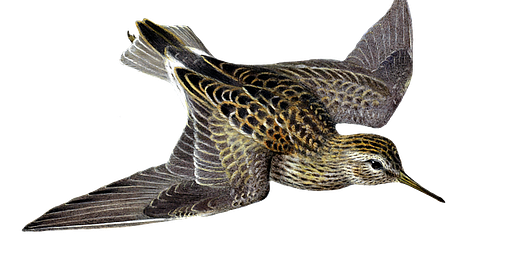The Sandpiper by Celia Thaxter Across the lonely beach we flit, One little sandpiper and I, And fast I gather, bit by bit, The scattered driftwood, bleached and dry. The wild waves reach their hands for it, The wild wind raves, the tide runs high, As up and down the beach we flit, One little sandpiper and I. Above our heads the sullen clouds Scud, black and swift, across the sky; Like silent ghosts in misty shrouds Stand out the white lighthouses high. Almost as far as eye can reach I see the close-reefed vessels fly, As fast we flit along the beach, One little sandpiper and I. I watch him as he skims along, Uttering his sweet and mournful cry; He starts not at my fitful song, Nor flash of fluttering drapery. He has no thought of any wrong, He scans me with a fearless eye; Stanch friends are we, well tried and strong, The little sandpiper and I. Comrade, where wilt thou be to-night, When the loosed storm breaks furiously? My driftwood fire will burn so bright! To what warm shelter canst thou fly? I do not fear for thee, though wroth The tempest rushes through the sky; For are we not God's children both, Thou, little sandpiper, and I?
"The Sandpiper" is an emotional poem by Celia Thaxter that sketches the fragile bond between nature and human life. The poem creates graphic imagery of a sandpiper, a shorebird that moves quickly along the beach, dealing with transience, longing, and the quest for identity.
The bird in the poem is a sandpiper, flitting along the shoreline, advertising his curiosity and restlessness, ready to go. It appears symbolic of deeper emotional restlessness, desire, and the quest for solace and yearning to find relief, which is quintessentially human. How the bird interacts with the sand and water corresponds with the natural world and the connection to nature that man usually seeks as a comforter in a complex life.
Thaxter uses the best sensory details, allowing the reader to picture the setting and feel the essence of the bird's freedom. The poem's inherent rhythmic quality resonates with the flowing tides, making continuity and change implicit in nature and existence all the more pronounced.
Ultimately, "The Sandpiper" is all about the beauty and brevity of life. Thaxter, through the viewpoint of the journey of the sandpiper, has asked the reader to consider the paths taken that will detail the restless pursuit of peace in a changing world.






Allain, Thanks so much for sharing this Celia Thaxter poem. Celia Thaxter grew up on and lived most of the her life on the isles of Shoals off the coast of New Hampshire. On clear days we can see them from the coast where I live. She's a fascinating woman.
Thanks for the poem.
Soothing.